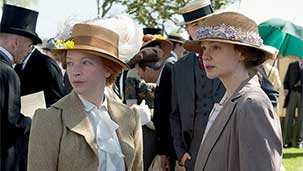In 1913 you quite literally gave your life for the cause; the right for women to vote. You and your sisters-in-arms endured public humiliation, beatings at the hands of police, and brutal stints in prison. Not to mention, you know, the widespread, garden-variety sexism that was the norm in early 20th century Britain. Along with famed suffrage leader Emmeline Pankhurst and others, you espoused confrontational tactics in order to gain attention and support for the cause. You broke windows, blew shit up, and the government branded you terrorists. What you really were was an epic badass and a hero.
So why did you only show up half way through Suffragette?
You’d be pleased to know that the film about a movement you helped foster was written by a woman, and directed by a woman (who worked very hard to make sure the crew behind the camera was populated by a proportionate number of women). But instead of focusing on you or the militant organization behind suffrage, the movie chooses an unlikely hero to be our entry point into the story; a poor, working class mother.
Carey Mulligan plays Maud Watts, a laundry employee fed up with unfair working conditions and her predatory boss. Though reluctant to join the suffrage movement, she soon becomes deeply engaged in the cause, becoming what the local constabulary refer to as an “agitator”. Her humiliated husband kicks her out and forbids her to see her young son, thus making the suffrage movement the only thing in Maud’s life worth fighting for.
If you don’t recognize the name Maud Watts, it’s because she, and some other characters are fictional. Writer Abi Morgan lets us watch Maud grow from an obedient wife and employee, to a radicalized suffragette. Morgan, who also wrote Shame and Iron Lady, is an actor’s writer - just ask Michael Fassbender, and Meryl Streep (blink and you’ll miss her cameo here as Pankhurst). She leaves a lot of the character off the page and in the hands of Mulligan, who lets Maud emerge with melancholic dignity. Other characters, like Helena Bonham Carter’s rebellious nurse Edith Ellyn, and Maud’s stern husband Sonny, are not given as much dimension.
Real or composite, many of the characters and scenarios feel rote, with the exception of the scenes between Maud and Inspector Arthur Steed, who is tasked with taking down the Women’s Social and Political Union (WSPU). Played with grizzled righteousness by Brendon Gleeson, Steed compares the suffragettes to anarchists and Fenian agitators, and sees them as a threat against the government and the king. Mulligan and Gleeson’s interactions are reminiscent of those between Bobby Sands and Father Dominic in Hunger; rife with tension, steely resolve, and begrudging respect. Sadly these interactions are too few.
Director Sarah Gavron infuses Suffragette with diligent attention to period detail while subtly illustrating the progress of the new century beside the tenuous grasp of the old. Double decker buses share the road with horses and carriages, the WSPU uses telephones and printing presses, Steel’s officers use cameras to secretly to track the suffragette’s movements, all in effort to remind us that this really wasn’t such a long time ago.
Perhaps your character is not given as much screen time because Morgan and Gavron thought the audience would find it easier to root for a woman who has lost everything. Suffragette, unfortunately, isn’t really for me, but for a younger audience of women and men who maybe aren’t so familiar with the early women’s rights movement. This is why at times the film feels like a primer. The real suffrage movement was far more fractious and messy – it included women of colour, lesbians, imperialism, elitism, racism, and people and events that don’t necessarily lend themselves to an easy narrative.
The backlash against the movie Suffragette for white-washing history, and against the cast for being tone-deaf, is unfortunate but not unwarranted. The movie is good, but not good enough to rise above its own prejudices. Your triumphant heroics – and those of Sophia Duleep Singh, Annie Kenney and others - are worthy of their own biopic. If that happens, I’ll be sure to let you know how it turns out.
With gratitude,
Di







